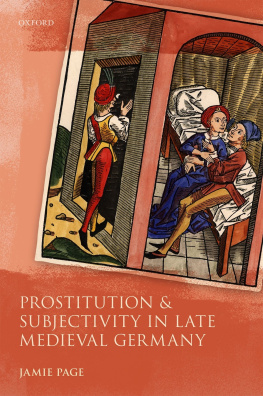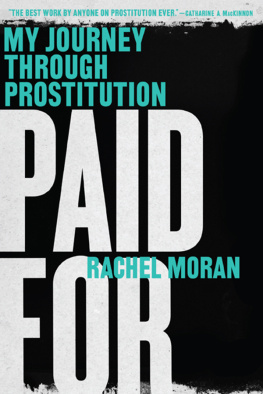Lilas House
Male Prostitution in Latin America
Lilas House
Male Prostitution in Latin America
Jacobo Schifter, PhD
Translated by
Irene Artavia Fernndez
Sharon Mulheren
First published by 1998 The Haworth Press, Inc., 10 Alice Street, Binghamton, NY 13904-1580
This edition published 2014 by Routledge
711 Third Avenue, New York, NY 10017
2 Park Square, Milton Park, Abingdon, Oxon OX14 4RN
Routledge is an imprint of the Taylor & Francis Group, an informa business
1998 by The Haworth Press, Inc. All rights reserved. No part of this work may be reproduced or utilized in any form or by any means, electronic or mechanical, including photocopying, microfilm, and recording, or by any information storage and retrieval system, without permission in writing from the publisher.
Cover design by Marylouise E. Doyle.
Library of Congress Cataloging-in-Publication Data
Schifter, Jacobo.
[Casa de Lila. English]
Lilas house : male prostitution in Latin America / Jacobo Schifter.
p. cm.
Includes bibliographical references and index.
ISBN 0-7890-0593-X (alk. paper).
1. Male prostitutionCosta RicaSan Jos. 2. Male prostitutesCosta RicaSan Jos. I. Title.
HQ154.A5S3413 1998
306.7420972863dc21
98-26319
CIP
I feel the pain again
here, now, in this place.
I take the path of the mirror,
I stop at the threshold,
I look at it and I see the reflection;
Your reflection
I cannot identify
what I feel,
or what I see,
or what you are trying to tell me.
You speak a language that is difficult
to understand.
Antonio Bustamante
ABOUT THE AUTHOR
Jacobo Schifter, PhD, is currently the Regional Director of ILPES (The Latin American Health and Prevention Institute), an AIDS prevention program financed by the Netherlands government. His initial publications included The Hidden Face of the Costa Rican Civil War (1979), two books on U.S.-Costa Rican relations, and one on Costa Rican anti-Semitism. However, once AIDS began to impact Central America, Dr. Schifter shifted interests and established the first regional institute to fight the epidemic, as well as created dozens of innovative programs, such as AIDS hotlines, AIDS prevention workshops for Latin gays, prisoners, street children, Indians, male sex workers, and other minority groups. Dr. Schifter has published many other controversial, best-selling books, such as The Formation of a Counterculture: AIDS and Homosexuality in Costa Rica (1989), Men Who Love Men (1992), Eyes That Do Not See: Psychiatry and Homophobia (1997). In 1997, he was asked by the University of London to participate in an anthology on male prostitution and HIV infection, which led to this study of the unexplored world of male prostitution in a Latin context.
CONTENTS
Foreword
Hans Moerkerk
I first met Jacobo Schifter at a conference on AIDS hot lines organized by the Dutch Government and the European Commission in Curacao in 1990. He introduced himself, and presented me with an interesting project proposal in the area of AIDS prevention. I glanced at it, but did not give it much thought at the time; as the representative of a donor country, one receives many such proposals during the course of an international conference.
However, upon my return to the Netherlands, I started to read the document with growing interest. Not only had I come across some of Jacobos other work on gay men and the Costa Rican Jewish community, but I was intrigued by his unconventional and highly original approach to AIDS prevention.
It was on the strength of this proposal that the Dutch Government first became involved in prevention work in the Central American region, and what began as a simple telephone hot line (Con Voz) soon blossomed into a highly enterprising, action-oriented organization known as the Latin American Institute for Health Prevention and Education (ILPES).
Moreover, at a personal level, I would like to stress the degree to which Jacobos writings on sexuality and minority empowerment have influenced my own work in developing countries, both by providing me with a better understanding of human behavior, and by challenging me to find new ways of opening up bureaucratic systems to innovation and creativity.
In this book, we find the author at his best. Casting aside the trappings of false neutrality, Jacobo becomes actively engaged with his subject matter, while at the same time proving to be an articulate defender of the human rights of those whom Lilas House is about. However, this is not to suggest that the book is merely an account of the relentless discrimination faced by a community relegated to the margins of social life. At a broader level, it also offers readers an incisive exploration of the relationship between adolescent sexual development and a cultural context that remains heavily inscribed with the social mores of the nineteenth century. Moreover, by calling into question our assumptions and fixed ideas about sex and sexual orientation, Jacobo provides us with useful tools in the fight against HIV/AIDS, both in Costa Rica and in Latin America more generally.
Thus, given the undoubted significance of Jacobos contributions, let us hope that more of his writings are translated into other languages; the world can only benefit by becoming familiar with them.
Hans Moerkerk
Ministry of Foreign Affairs,
The Netherlands
Many people have helped make this study possible. First of all, Peter Aggleton of the University of London convinced me to conduct a study on male prostitution for an anthology to be published in the United Kingdom by UCL Press. Peter Aggleton helped me translate a short version of the study into English, and participated as editor and co-author. His suggestions were extremely helpful in improving the manuscript.
Antonio Bustamante coordinated the data collection phase, made the initial contacts, obtained permission to enter Lilas house, and served as a consultant on the topic of cacherismo in Central America.
Lidia Montero helped transcribe the interviews, an extremely tedious job because of the enormous volume of material gathered.
My friend and collaborator at ILPES Research Department, Johnny Madrigal, MSc, made excellent suggestions and gave the final approval before the book was sent to the publisher.
Without Lila and the young men, this project would never have been possible. Despite the risks for everyone involved, their collaboration has left me deeply indebted to them. ILPES launch of a prevention program and the opening of a clubhouse for sex workers are small tokens of my appreciation.
Julin Gonzlez, a linguistics specialist and one of the best editors in the country helped eliminate much of the Spanglish that I learned during my time in the United States.
Hector Elizondo, coordinator of ILPES Group 2828, who works with groups of gay sex workers was, as always, the first to give me the green light for publication. His sixth sense for literature and his ability to tell me what he does not like is, for me, irreplaceable.
Nevertheless, the responsibility for what is written in this book is mine and mine alone. My interpretations do not represent any official position of the Institute, the donor, any of my co-workers who collaborated on this project, or the publisher.







